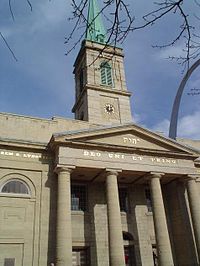Tetragrammaton
From Wikipedia, the free encyclopedia

Tetragrammaton (from the Greek τετραγράμματον, meaning '[word of] four letters' (tetra "four" + gramma (gen. grammatos) "letter"), [1] refers to יהוה, a name used by the Hebrew Masoretic Text to refer to the deity of the Israelites. The Jewish conception of God holds that this is one of several names for the deity.
יהוה is composed of four Hebrew consonants, and it occurs 6,828 times in the consonantal Hebrew text of both the Biblia Hebraica and Biblia Hebraica Stuttgartensia, despite not appearing at all in the Song of Songs, Ecclesiastes, or Esther.[2] יהוה is sometimes referred to as the unvocalised Tetragrammaton since it contains no vowel points.
The letters, properly read from right to left (in Biblical Hebrew), are:
-
Hebrew Letter name Pronunciation י Yodh "Y" ה He (pronounced "hey") "H" ו Waw "W" or placeholder for "O"/"U" vowel (see mater lectionis) ה He "H" (or sometimes silent at the ends of words)

These four letters are usually transliterated from Hebrew as IHVH in Latin, JHWH in German, French and Dutch, and YHWH in English. This was variously rendered as "Yahweh" or "Jehovah", since in Latin there was no distinct lettering to distinguish 'Y' from 'J', or 'W' from 'V', and the Hebrew does not clearly indicate the omitted vowels. In English translations, it is often rendered in small capital letters as "the LORD", following Jewish tradition which reads the word as "Adonai" ("Lord") out of respect for the name of God and the commandment not to take the name of God in vain. The word "haŠem" 'the Name' is also used in Jewish contexts; in Samaritan, "Šemå" is the normal substitution.
See "Historical overview" at Yahweh and Jehovah.
Contents |
[edit] Pronunciation
For views on the pronunciation of the name, see the main article, Yahweh.
[edit] Occurrences and uses
The Tetragrammaton occurs 6,828 times in the Hebrew text of both the Biblia Hebraica and Biblia Hebraica Stuttgartensia.[2] It does not appear in the Song of Songs, Ecclesiastes, or Esther. It first appears in the Hebrew text in Genesis 2:4.
| It has been suggested that the section Usage of the name YHWH from the article Yahweh be merged into this article or section. (Discuss) |
[edit] The Leningrad Codex of 1008-1010 A.D.
Vowel points were added to the Tetragrammaton by the Masoretes, in the first millennium A.D.
Six different Hebrew spellings of the Tetragrammaton are found in:
The Leningrad Codex of 1008-1010 A.D. as shown below (note that the entries in the transliteration column are not intended to indicate how the name is pronounced, but only how the word would be pronounced if read like any other word):
| Chapter & Verse | Hebrew Spelling | Transliteration |
|
Explanation |
|
|
|
|
|
This is the most common set of vowels, which are essentially the vowels from Adonai (with the hataf patah reverting to its natural state as a shwa). |
|
|
|
|
|
This is the same as above, but with the dot over the holam/waw left out, because it is a little redundant. |
|
|
|
|
|
When the Tetragrammaton is preceded by Adonai, it receives the vowels from the name Elohim instead. The hataf segol does not revert to a shwa because doing so could lead to confusion with the vowels in Adonai. |
|
|
|
|
|
Just as above, this uses the vowels from Elohim, but like the second version, the dot over the holam/waw is omitted as redundant. |
|
|
|
|
|
Here, the dot over the holam/waw is present, but the hataf segol does get reverted to a shwa. |
|
|
|
|
|
Here, the dot over the holam/waw is omitted, and the hataf segol gets reverted to a shwa. |
The * indicates that the transliteration “e” indicates a Hatef Segol.
[edit] Loss from the Septuagint
| It has been suggested that the section Loss of the Tetragrammaton in the Septuagint from the article Yahweh be merged into this article or section. (Discuss) |
[edit] In the New Testament
| It has been suggested that the section In the New Testament from the article Yahweh be merged into this article or section. (Discuss) |
[edit] See also
[edit] References
- ^ Online Etymology Dictionary
- ^ a b "Importance of the Name". Insight on the Scriptures. vol. 2. Watchtower Bible and Tract Society of Pennsylvania. 1988. p. 8.
[edit] External links
 Media related to Tetragrammaton at Wikimedia Commons
Media related to Tetragrammaton at Wikimedia Commons "Tetragrammaton". Encyclopædia Britannica (11th ed.). 1911.
"Tetragrammaton". Encyclopædia Britannica (11th ed.). 1911.

